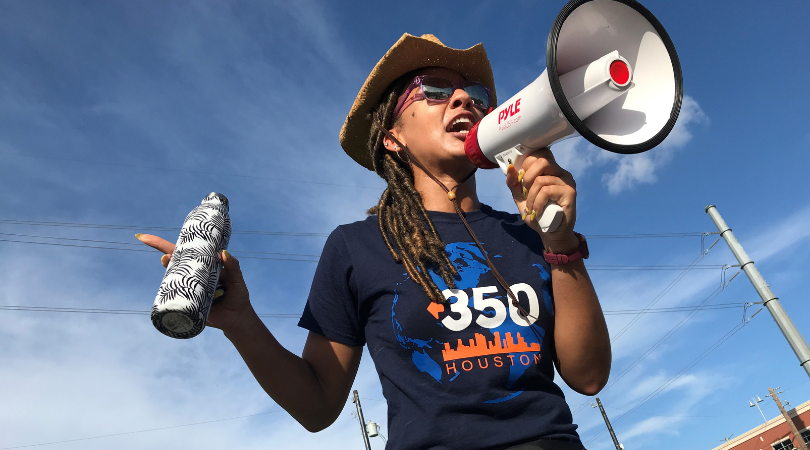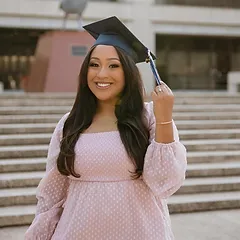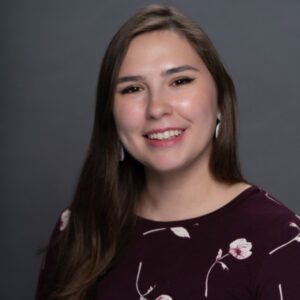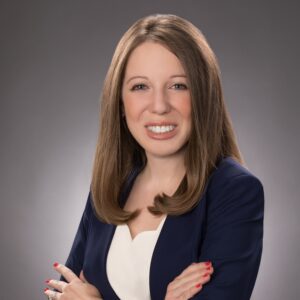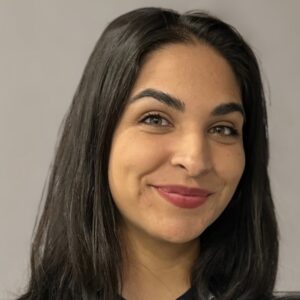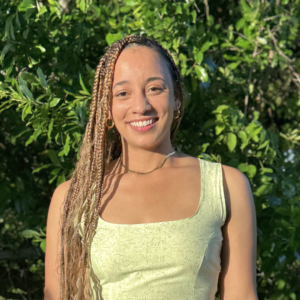 Shelly Baker is the Political Director of Deeds Not Words, a political organization mobilizing young people in grassroots work and empowering them to dismantle oppressive systems in our nation. While she is now a force in the Texas organizing sphere, she got her start in New Orleans, Louisiana where she was first exposed to the injustices underserved communities faced. With generations of family from Louisiana, Shelly would often hear conversations from family members about the issues within her city. She remembers being young and hearing about the frequent flooding in Louisiana and the discussions of how certain parts of the city were protected while others were not. With the lack of infrastructure to support certain communities during flooding, it was not uncommon for lower income residents and people of color to be disproportionately affected by this. She saw firsthand how the impact of disasters like Hurricane Katrina had on her community and loved ones.
Shelly Baker is the Political Director of Deeds Not Words, a political organization mobilizing young people in grassroots work and empowering them to dismantle oppressive systems in our nation. While she is now a force in the Texas organizing sphere, she got her start in New Orleans, Louisiana where she was first exposed to the injustices underserved communities faced. With generations of family from Louisiana, Shelly would often hear conversations from family members about the issues within her city. She remembers being young and hearing about the frequent flooding in Louisiana and the discussions of how certain parts of the city were protected while others were not. With the lack of infrastructure to support certain communities during flooding, it was not uncommon for lower income residents and people of color to be disproportionately affected by this. She saw firsthand how the impact of disasters like Hurricane Katrina had on her community and loved ones.
In addition to the flooding and climate justice, education was another aspect of her childhood that helped shape her political perspective. It was normal for students like herself to be bussed to different school districts to attend a school in a better district. Having to do this and seeing others do the same made the issues of racial and economic disparities apparent to Shelly at a young age. That is why Shelly and her grandmother were not silent when talk circulated that the local school board considered stopping this bus system which allowed students to have transportation to different districts. Leaving students to find an alternative transportation such as the public city bus to school, meant that there was a new barrier between children and a quality education. Shelly and her grandmother attended a school board meeting to protest this. She credits this event to shaping her ability to see the power of being able to speak up for yourself, helping her realize that one does not have to remain quiet when you see something happening that is affecting you or your community.
When asked about her first role model, Shelly remembers Ms. Francis, her second-grade teacher. She recalls Ms. Francis being very empathetic and kind while also being firm and caring for everyone including her peers that struggled more in the classroom. “She was the first person where I thought, okay, that is who I want to be like,” shared Shelly. After going into the foster care system at age 17, Shelly was forced to grow up quickly and support herself financially, making it harder to be the person she wanted to be in giving back and helping others. This shift caused her to limit herself in ways and question her ability to pursue something due to the lack of financial support. Shelly knew she wanted to help others in some capacity in her career and was reminded of the social workers that helped her in the foster care system. She would later earn her Master’s in Social Work from Virginia Commonwealth University. While pursuing her Master’s, Shelly realized how little people cared about social work and the youth. “The lack of investment and care given to young people in this country is maddening. Hearing people talk about my home and the people that lived there blew my mind. It was jarring. I know these places and faces,” she stated.
While pursuing her master’s degree, Shelly was interacting with individuals in need of help and recalls interacting with clients and realizing that the hardships they were experiencing was a direct impact of the lack of a particular resource. Knowing this, Shelly was influenced to take a holistic approach to community work and would eventually lead to her journey in grassroots work. At the forefront of her work is the priority to organize in a way that respects people. She explains that she comes from a “help perspective” where if work is already being done for a cause, she will help as opposed to immediately starting something of her own. This kind of mindset helped Shelly in organizing protests in honor of Breonna Taylor, a young Black woman murdered in her home by police officers in Louisville, Kentucky. Shelly reached out to people experienced in organizing and used their insight to lead the protest. By taking the time to do her research and ask for help from people already doing that kind of work, Shelly was able to feel more confident in what she was doing and was supported by her counterparts. Her grassroots efforts extended to electoral work in organizing Black and Brown communities. In a time where people are becoming more disconnected with electoral politics, Shelly saw the importance of registering people to vote and providing the tools to empower marginalized groups.
After graduating from college, Shelly relocated to Houston, Texas where she participated in a climate justice fellowship with 350 Action and the AFL-CIO Gulf Coast chapter. One of Shelly’s biggest accomplishments in her career has been her overall ability to help connect people with opportunities to become engaged civically. She also reflects on the work she has done to help others, specifically the work she did in Houston, Texas during the 2021 winter storm. During this time Shelly spearheaded much of the food and water distribution, being one of the firsts to distribute these resources even before government assistance for this began. Shelly helped organize truckloads of water and plumbing supplies from Richmond, Virginia to Houston, Texas in collaboration with the Carrizo Comecrudo Tribe of Texas. Shelly’s commitment to uplifting her community is second nature to her, “I don’t know if I would consider this an accomplishment, just something that I did,” she says. When the funds to help the Houston community came, Shelly was finding ways to turn monetary donations into resources for others, an important task to ensure that the needs of her community were met, and donations are allocated appropriately.
Shelly’s advice to the next generation includes having a good community and to do that she urges people to evaluate their actions to ensure one is not unintentionally discriminating against others and to have the tough conversations that are ultimately necessary in a growing community.
